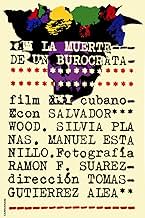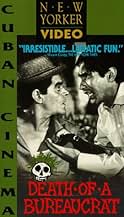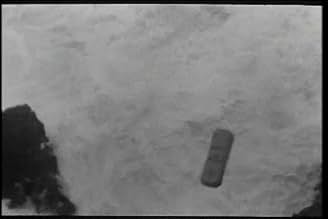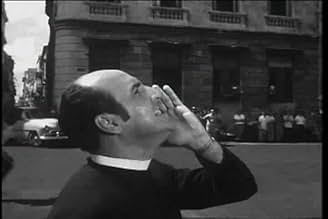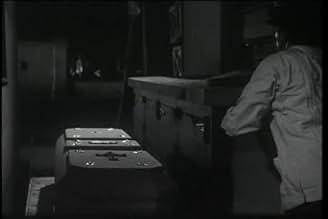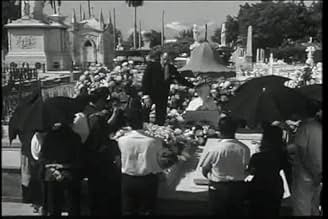PUNTUACIÓN EN IMDb
7,6/10
1,6 mil
TU PUNTUACIÓN
Añade un argumento en tu idiomaA young man attempts to fight the system in an entertaining account of bureaucracy amok and the tyranny of red tape.A young man attempts to fight the system in an entertaining account of bureaucracy amok and the tyranny of red tape.A young man attempts to fight the system in an entertaining account of bureaucracy amok and the tyranny of red tape.
- Dirección
- Guión
- Reparto principal
- Premios
- 1 premio y 1 nominación en total
Reseñas destacadas
For a movie that was released 40 years ago, this one has aged particularly well.
I think I'm not exaggerating by saying that this movie represents something of a precursor of the Monty Python movies, alas, not so irreverent. But the way it deals with the topic, and the imaginative gags and inter-cuts that it has, can only remind you of those English geniuses.
But is also many things. A little of Three Stooges here. Even a little Chaplin there...
How you can make something funny out of the situation of a family (the main character and his aunt) that cannot get his relative buried, and have to keep him home until the red tape is overpowered, without losing sight of the human touch and their despair?. You'd need a very skillful director to juggle all that successfully.
I Haven't seen or heard of a Latin American movie like this one. It must be considered a milestone in Latin American cinema (and certainly, in world cinema). Regretfully, not the style, or the genius of the director Tomás Gutiérrez Alea, seem to have had dedicated followers. I'm afraid that has something to do with the Cuban origin, not because of Cuban backlash, but because of lack of interest or attention over Cuban art during the 60's. Latin America has produced a lot of movies, but most of them are dead serious. When somebody comes with the idea of a comedy, it is very light, unfunny and clichéd, nothing to tell the world about, with very few exceptions.
That's why I was surprised by LA MUERTE DE UN BURÓCRATA and I highly recommend it, if you can find it somehow.
I think I'm not exaggerating by saying that this movie represents something of a precursor of the Monty Python movies, alas, not so irreverent. But the way it deals with the topic, and the imaginative gags and inter-cuts that it has, can only remind you of those English geniuses.
But is also many things. A little of Three Stooges here. Even a little Chaplin there...
How you can make something funny out of the situation of a family (the main character and his aunt) that cannot get his relative buried, and have to keep him home until the red tape is overpowered, without losing sight of the human touch and their despair?. You'd need a very skillful director to juggle all that successfully.
I Haven't seen or heard of a Latin American movie like this one. It must be considered a milestone in Latin American cinema (and certainly, in world cinema). Regretfully, not the style, or the genius of the director Tomás Gutiérrez Alea, seem to have had dedicated followers. I'm afraid that has something to do with the Cuban origin, not because of Cuban backlash, but because of lack of interest or attention over Cuban art during the 60's. Latin America has produced a lot of movies, but most of them are dead serious. When somebody comes with the idea of a comedy, it is very light, unfunny and clichéd, nothing to tell the world about, with very few exceptions.
That's why I was surprised by LA MUERTE DE UN BURÓCRATA and I highly recommend it, if you can find it somehow.
Tomas Gutierrez Alea, Death of a Bureaucratic, Cuba, 1966
In a time of struggle between the United States and Cuba, when film was forbidden to leave Cuba, Tomas Gutierrez Alea managed to smuggle his Death of a Bureaucratic from his country. This great feat allowed Americans to view a Cuban's cinematography and also his satirical perspective of Cuban society under the reign of Castro. I believe that Alea did a wonderful job of showing how society and government worked during that time by using humor to depict a dark time. There was much symbolism present and foreshadowing. Since he was successful in turning otherwise disturbing situations into humorous ones, I think he could catch a broader audience and allow them to gain a small view of the situation in Cuba.
As the basis of the film, I believe that Alea was trying to show the government in the time of Castro rule. The Death of a Bureaucratic is a very fitting title to show this theme. Throughout the film there are scenes of artists' artwork advertising the smashing of bureaucracy. The overseer of the art was constantly critiquing his artists' works, telling them that the biceps needed to be much larger. Was this an attempt to portray that one must flex their muscles in order to appear, and not necessarily be, stronger and mightier? That Cuba or Castro was stronger and mightier than anyone else? Also, I believe that the major component of showing government in that time was how the nephew had to jump through so many hoops in order to obtain a simple document. First, he needed Paco's work card (for which he had been buried with). Then after unearthing Paco illegally, he had to get the same paperwork to bury him again. The humorous and frustrating parts were how many people and departments that the nephew had to see and go through in order to receive the approval to bury his uncle again. A funny part showing the regime of Castro was when one office worker was distributing a set amount of toilet paper to another. I thought it amusing and a good way to show how stringent and strict the government was.
There was a multitude of symbolism. I question the importance of beginning and ending the film with the sculpted angel in the cemetery. Paco was a sculptor and part of the story's theme was based on death – burying Paco, unearthing him, trying to rebury him and the demise of his nephew. Was the angel just a theatrical addition or possibly one showing the death of two souls? The sculptures also come into play that Paco was attempting to create a bust of Castro for every family in Cuba. In the end, that came to the demise of Paco and his nephew.
Death was highly prevalent in some obscure and obvious ways. I thought it funny that outside the first office the nephew enters, to get the needed approval, there is a man sitting with a scythe. Then the waiter has fangs at the restaurant where the nephew comes to an agreement with the cemetery crew to help him open his uncle's casket. Another amusing aspect that I noticed was that the mortician had a skeleton hanging in his rear-view mirror. The blackbirds that the nephew kept seeing, I believe, foreshadowed his impending demise and kept with a theme of death.
As far as the cinematography, there were many elements I thought interesting. The one that stood out most to me was when Paco's machine malfunctioned and he was attempting to fix it. That scene differed from the rest of the movie. It was cartoon-like. The accelerated motion added to this element. That scene reminded me of movies during Charlie Chaplin's time when there was no sound and the actors were over-dramatic in order to express the emotion and events in the film. I thought the transitions between scenes were defined and effective. It seemed to me that they were close to what we see in movies today. Alea's choice of score blended in to where I didn't feel that it overpowered the shot or effectiveness of the acting and film but was rather mostly an enhancement.
A review from IMDb.com references the dream sequences used by Alea. They make reference that these are similar to those of Bunnel. Said dream sequences baffled me. There was an homage made to Alea's friend, Dali, when the nephew, Juanchin, was pulling the coffin. This was a sign of carrying a heavy weight or baggage. Although the dreams were a prominent part in the film, I found them confusing and creepy.
All in all, I believe that Alea's Death of a Bureaucratic was a humorous portrayal of the darker time under Castro's rule.
In a time of struggle between the United States and Cuba, when film was forbidden to leave Cuba, Tomas Gutierrez Alea managed to smuggle his Death of a Bureaucratic from his country. This great feat allowed Americans to view a Cuban's cinematography and also his satirical perspective of Cuban society under the reign of Castro. I believe that Alea did a wonderful job of showing how society and government worked during that time by using humor to depict a dark time. There was much symbolism present and foreshadowing. Since he was successful in turning otherwise disturbing situations into humorous ones, I think he could catch a broader audience and allow them to gain a small view of the situation in Cuba.
As the basis of the film, I believe that Alea was trying to show the government in the time of Castro rule. The Death of a Bureaucratic is a very fitting title to show this theme. Throughout the film there are scenes of artists' artwork advertising the smashing of bureaucracy. The overseer of the art was constantly critiquing his artists' works, telling them that the biceps needed to be much larger. Was this an attempt to portray that one must flex their muscles in order to appear, and not necessarily be, stronger and mightier? That Cuba or Castro was stronger and mightier than anyone else? Also, I believe that the major component of showing government in that time was how the nephew had to jump through so many hoops in order to obtain a simple document. First, he needed Paco's work card (for which he had been buried with). Then after unearthing Paco illegally, he had to get the same paperwork to bury him again. The humorous and frustrating parts were how many people and departments that the nephew had to see and go through in order to receive the approval to bury his uncle again. A funny part showing the regime of Castro was when one office worker was distributing a set amount of toilet paper to another. I thought it amusing and a good way to show how stringent and strict the government was.
There was a multitude of symbolism. I question the importance of beginning and ending the film with the sculpted angel in the cemetery. Paco was a sculptor and part of the story's theme was based on death – burying Paco, unearthing him, trying to rebury him and the demise of his nephew. Was the angel just a theatrical addition or possibly one showing the death of two souls? The sculptures also come into play that Paco was attempting to create a bust of Castro for every family in Cuba. In the end, that came to the demise of Paco and his nephew.
Death was highly prevalent in some obscure and obvious ways. I thought it funny that outside the first office the nephew enters, to get the needed approval, there is a man sitting with a scythe. Then the waiter has fangs at the restaurant where the nephew comes to an agreement with the cemetery crew to help him open his uncle's casket. Another amusing aspect that I noticed was that the mortician had a skeleton hanging in his rear-view mirror. The blackbirds that the nephew kept seeing, I believe, foreshadowed his impending demise and kept with a theme of death.
As far as the cinematography, there were many elements I thought interesting. The one that stood out most to me was when Paco's machine malfunctioned and he was attempting to fix it. That scene differed from the rest of the movie. It was cartoon-like. The accelerated motion added to this element. That scene reminded me of movies during Charlie Chaplin's time when there was no sound and the actors were over-dramatic in order to express the emotion and events in the film. I thought the transitions between scenes were defined and effective. It seemed to me that they were close to what we see in movies today. Alea's choice of score blended in to where I didn't feel that it overpowered the shot or effectiveness of the acting and film but was rather mostly an enhancement.
A review from IMDb.com references the dream sequences used by Alea. They make reference that these are similar to those of Bunnel. Said dream sequences baffled me. There was an homage made to Alea's friend, Dali, when the nephew, Juanchin, was pulling the coffin. This was a sign of carrying a heavy weight or baggage. Although the dreams were a prominent part in the film, I found them confusing and creepy.
All in all, I believe that Alea's Death of a Bureaucratic was a humorous portrayal of the darker time under Castro's rule.
Those of us who have been frustrated by trying to get large organizations (whether private or public) to take action might well enjoy Tomas Alea's Death of a Bureaucrat (1966), said to be a satire on communism / socialism, but which could equally apply to big business or the civil service / local government.
After a well-regarded worker has died (in a ludicrous accident recalling Modern Times and looking like an influence on Monty Python), his widow (Silvia Planas) and nephew (Salvador Wood) go to arrange for her pension. Unfortunately, his union card has been buried with the fellow, and nothing can be done without it. So, off goes the nephew to arrange an exhumation. Oh, no, you have to wait two years for that one! In desperation the poor fellow hires a group of chaps to sneak into the cemetery and open the coffin, but of course this goes wrong too, and our hero ends up with a coffin and a corpse on his hands. Being an honest fellow, he explains the situation but is told Uncle can't be buried without an exhumation order...
Very funny at times, this film has nods to Chaplin, Laurel and Hardy, Bunuel, Harold Lloyd and Keaton (all acknowledged) in a mixture of satire and slapstick which follows the poor chap into an ever-confused mass of paperwork, unhelpful officials and rules designed to frustrate and infuriate the gentlest of souls. At almost every turn one sees people shifting great masses of documents or passing responsibility onto other workers in scenes reminiscent of the 'Office of Circumlocution' in Dickens's Bleak House. Either that or doing things which have no relation to what they are supposed to do.
This is certainly worth a look.
After a well-regarded worker has died (in a ludicrous accident recalling Modern Times and looking like an influence on Monty Python), his widow (Silvia Planas) and nephew (Salvador Wood) go to arrange for her pension. Unfortunately, his union card has been buried with the fellow, and nothing can be done without it. So, off goes the nephew to arrange an exhumation. Oh, no, you have to wait two years for that one! In desperation the poor fellow hires a group of chaps to sneak into the cemetery and open the coffin, but of course this goes wrong too, and our hero ends up with a coffin and a corpse on his hands. Being an honest fellow, he explains the situation but is told Uncle can't be buried without an exhumation order...
Very funny at times, this film has nods to Chaplin, Laurel and Hardy, Bunuel, Harold Lloyd and Keaton (all acknowledged) in a mixture of satire and slapstick which follows the poor chap into an ever-confused mass of paperwork, unhelpful officials and rules designed to frustrate and infuriate the gentlest of souls. At almost every turn one sees people shifting great masses of documents or passing responsibility onto other workers in scenes reminiscent of the 'Office of Circumlocution' in Dickens's Bleak House. Either that or doing things which have no relation to what they are supposed to do.
This is certainly worth a look.
10Aw-komon
Forget post-revolutionary Cuba; right here in America, in 2000, there is enough bureaucracy for the comedic lessons of Alea's great film about people's propensity to conform at all costs to absurd restrictions from 'above' and cause misery to others rather than risk the slightest insecurity to themselves, to be driven home painfully. This is a really funny film but one that makes you think, like Tati's 'Playtime,' Fellini's early films or some of Bunuel's. This film is deeply critical and ridicules everything that is part and parcel of government enforced socialism. You can't fault Castro for not having a sense of humor, if he agreed to release this film. Leo Beower's understated music is, as always, excellent.
Although I have consciously kept my foreign film viewing to a minimum during this Christmas season, I couldn't resist purchasing this one (whose release on R2 DVD from Network came literally out of left field) and watching it instantly, given its opening dedication to many an exponent of cinema (more on this later). As far as I can recall, it also marks my introduction to Cuban cinema which, as can be surmised by the title, deals with the country's social structure; considering the political situation of the time in which it was made, this is hardly a surprise
but, what is unexpected is the fact that it treats the subject matter as black comedy!
The plot resolves itself in a succession of ironic developments with respect to the pension coming to the widowed wife of a veritable working-class hero (his sculpting endeavors and unfortunate demise are depicted via a stylized animation sequence): to get it, she needs her husband's union card but his equally proletarian comrades had it buried with him as a symbolic gesture. Her milquetoast nephew, who's really the hero of the film, decides to have the body exhumed but, officially, two years have to pass before this can be legitimately done; so, he hires two men to steal the body and then proposes to have it buried once more but, since there's no record of it having been exhumed in the first place, technically, this isn't possible either. And so on and so forth, with numerous episodes involving legal red tape (which ought to bring a smile and a strong sense of empathy to anyone who has ever dealt with a government entity) until the young man is literally driven to madness and murder! The film, then, ends with the funeral of this other bureaucrat
Going back to that dedication I mentioned earlier, the full text (typed on screen along with the film's full credits at the very beginning and signed by the director) reads thus: "The film is dedicated to Luis Bunuel, Oliver Hardy, Stan Laurel, Ingmar Bergman, Harold Lloyd, Akira Kurosawa, Orson Welles, Juan Carlos Tabio, Elia Kazan, Buster Keaton, Jean Vigo, Marilyn Monroe and all those who, in one way or another, have taken part in the film industry since the days of Lumiere." This is no faint praise, either, as THE DEATH OF A BUREAUCRAT features a handful of Bunuelian dream sequences and a general mockery of Christian burial services (one highly amusing little scene is when the nephew pilfers ice cubes for his drink from his aunt's supply who is forever breaking ice in order to preserve her husband's body!); a delightful tit-for-tat routine of wanton destruction occurring, of all places, at the cemetery (and which even develops into a Laurel & Hardy-style custard pie fight!); and, at one point, we're also treated to some Harold Lloyd-type antics on a ledge when our hero finds himself locked inside an office building!
Director Tomas Gutierrez Alea is himself generally considered to be the finest Cuban film-maker and among his other works worth mentioning are THE TWELVE CHAIRS (1962; which is also available on R2 DVD from Network and the 1970 Mel Brooks version of which, incidentally, I've just acquired), MEMORIES OF UNDERDEVELOPMENT (1968), THE LAST SUPPER (1976) and the Oscar nominated STRAWBERRY AND CHOCOLATE (1994); the local DVD shop has the latter available for rental and, as a result of this positive experience with Cuban cinema, I will certainly be giving it a spin one of these days
The plot resolves itself in a succession of ironic developments with respect to the pension coming to the widowed wife of a veritable working-class hero (his sculpting endeavors and unfortunate demise are depicted via a stylized animation sequence): to get it, she needs her husband's union card but his equally proletarian comrades had it buried with him as a symbolic gesture. Her milquetoast nephew, who's really the hero of the film, decides to have the body exhumed but, officially, two years have to pass before this can be legitimately done; so, he hires two men to steal the body and then proposes to have it buried once more but, since there's no record of it having been exhumed in the first place, technically, this isn't possible either. And so on and so forth, with numerous episodes involving legal red tape (which ought to bring a smile and a strong sense of empathy to anyone who has ever dealt with a government entity) until the young man is literally driven to madness and murder! The film, then, ends with the funeral of this other bureaucrat
Going back to that dedication I mentioned earlier, the full text (typed on screen along with the film's full credits at the very beginning and signed by the director) reads thus: "The film is dedicated to Luis Bunuel, Oliver Hardy, Stan Laurel, Ingmar Bergman, Harold Lloyd, Akira Kurosawa, Orson Welles, Juan Carlos Tabio, Elia Kazan, Buster Keaton, Jean Vigo, Marilyn Monroe and all those who, in one way or another, have taken part in the film industry since the days of Lumiere." This is no faint praise, either, as THE DEATH OF A BUREAUCRAT features a handful of Bunuelian dream sequences and a general mockery of Christian burial services (one highly amusing little scene is when the nephew pilfers ice cubes for his drink from his aunt's supply who is forever breaking ice in order to preserve her husband's body!); a delightful tit-for-tat routine of wanton destruction occurring, of all places, at the cemetery (and which even develops into a Laurel & Hardy-style custard pie fight!); and, at one point, we're also treated to some Harold Lloyd-type antics on a ledge when our hero finds himself locked inside an office building!
Director Tomas Gutierrez Alea is himself generally considered to be the finest Cuban film-maker and among his other works worth mentioning are THE TWELVE CHAIRS (1962; which is also available on R2 DVD from Network and the 1970 Mel Brooks version of which, incidentally, I've just acquired), MEMORIES OF UNDERDEVELOPMENT (1968), THE LAST SUPPER (1976) and the Oscar nominated STRAWBERRY AND CHOCOLATE (1994); the local DVD shop has the latter available for rental and, as a result of this positive experience with Cuban cinema, I will certainly be giving it a spin one of these days
¿Sabías que...?
- CuriosidadesThe girl who plays the girl n the black bikini with a hammer in the "Death to Bureaucracy" parade is Regina Amador, top model at Tropicana Club Havana, Cuba 1962-1968.
- Créditos adicionalesDedicated to Luis Buñuel, Stan Laurel and Oliver Hardy, Ingmar Bergman, Harold Lloyd, Akira Kurosawa, Orson Welles (as Orson Wells), Juan Carlos Tabio, Elia Kazan, Buster Keaton, Jean Vigo, Marilyn Monroe.
- Banda sonoraCoja el paso
Written by Frank Dominguez
Selecciones populares
Inicia sesión para calificar y añadir a tu lista para recibir recomendaciones personalizadas
- How long is Death of a Bureaucrat?Con tecnología de Alexa
Detalles
- Fecha de lanzamiento
- País de origen
- Idioma
- Títulos en diferentes países
- Death of a Bureaucrat
- Localizaciones del rodaje
- La Habana, Cuba(town of the action)
- Empresa productora
- Ver más compañías en los créditos en IMDbPro
Taquilla
- Recaudación en todo el mundo
- 3323 US$
- Duración
- 1h 25min(85 min)
- Color
- Mezcla de sonido
- Relación de aspecto
- 1.66 : 1
Contribuir a esta página
Sugerir un cambio o añadir el contenido que falta

